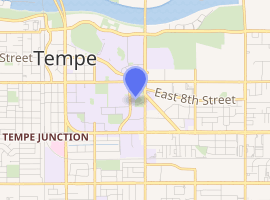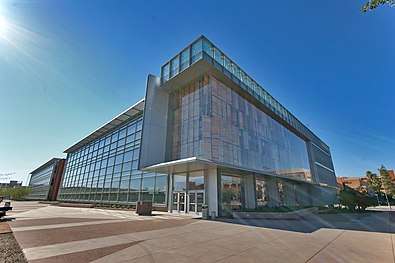The Biodesign Institute
The Biodesign Institute is a major research center known for nature-inspired solutions to global health, sustainability, and security challenges located on the Tempe campus of Arizona State University. The Institute is organized into a growing number of collaborative research centers and laboratories staffed by scientists in diverse disciplines. It is currently led by Executive Director Dr. Joshua LaBaer, a personalized diagnostics researcher.[1]
| ASU Biodesign Institute | |
|---|---|
 | |

| |
| General information | |
| Type | Research Institute |
| Location | Arizona State University: Tempe Campus |
| Address | 727 E. Tyler St. Tempe, Arizona 85287 |
| Coordinates | 33°25′10″N 111°55′41″W |
| Construction started | Building A - February 2003 Building B - March 2004 Building C - October 2016 Building D - TBD |
| Completed | Building A - January 2005 Building B - January 2006 Building C - September 2018 Building D - TBD |
| Cost | Building A - $72.8 million Building B - $78.5 million Building C - $120 million Building D - TBD |
| Owner | Arizona State University |
| Technical details | |
| Structural system | Brick and glass curtain wall system, steel frame, concrete flooring |
| Floor count | 6 |
| Floor area | Building A - 177,661 s.f. Building B - 174,583 s.f Building C - 189,000 s.f. Building D - TBD |
| Design and construction | |
| Architecture firm | Buildings A & B - Gould Evans / Lord Aeck & Sargent Building C - ZGF Architects / BWS Architects Building D - TBD |
| Main contractor | Buildings A & B - DPR Construction / Sundt Corp. Building C - McCarthy Construction Building D - TBD |
| Awards and prizes | Building A - Gold-level LEED certified Building B - Platinum-level LEED certified Building C - TBD |
| Website | |
| https://biodesign.asu.edu | |
Overview
The Biodesign Institute performs biomedical and health research and develops solutions for environmental sustainability. The institute has more than 200 active research projects, with 65 tenured research faculty, who include one Nobel Prize winner and National Academy members, with collaborations around the world. The institute has attracted more than $740 million in extramural funding from competitive grant awards as well as support from philanthropic and industry sources. This resulted in more than 722 inventions since inception, resulting in 112 patents issued, 56 licensing agreements and a 24 spin-out ventures.
The Biodesign Institute is located on the Tempe campus of Arizona State University, a comprehensive multi-campus metropolitan university that is the largest in the U.S. by enrollment.
Under the leadership of university president Michael Crow, ASU is adding one million square feet of new research space to enhance the capabilities of the Institute and drive economic growth in the communities it serves.
Centers within the institute
| Name (Center for) | Director | |||
|---|---|---|---|---|
| Applied Structural Discovery, Biodesign Center for | Petra Fromme | |||
| Biocomputing, Security and Society, Biodesign Center for | Stephanie Forrest | |||
| Bioelectronics and Biosensors, Biodesign Center for | Nongjian Tao | |||
| BioEnergetics, Biodesign Center for | Sidney Hecht | |||
| Environmental Biotechnology, Biodesign Swette Center for | Bruce Rittmann | |||
| Environmental Health Engineering, Biodesign Center for | Rolf Halden | |||
| Fundamental and Applied Microbiomics, Biodesign Center for | Ferran Garcia-Pichel | |||
| Immunotherapy, Vaccines and Virotherapy, Biodesign Center for | Grant McFadden | |||
| Innovations in Medicine, Biodesign Center for | Stephen Albert Johnston | |||
| Mechanisms of Evolution, Biodesign Center for | Michael Lynch | |||
| Molecular Design and Biomimetics, Biodesign Center for | Hao Yan | Neurodegenerative Disease Research Center, ASU-Banner | Eric Reiman | |
| Personalized Diagnostics, Biodesign Virginia G. Piper Center for | Joshua LaBaer | |||
| Single Molecule Biophysics, Biodesign Center for | Stuart Lindsay | |||
| Pathfinder Center, Biodesign | Leland "Lee" H. Hartwell |
Leadership
Joshua LaBaer
Joshua LaBaer, a physician-scientist specializing in personalized diagnostics, was appointed interim executive director of the Biodesign Institute in January 2016.[2] He became permanent executive director in March 2017.[3]
Raymond DuBois
Raymond DuBois, a physician-scientist with expertise in translational cancer research, was appointed executive director of the Biodesign Institute on December 1, 2012.
Alan Nelson
Alan Nelson, an entrepreneur and a developer of a number of medical devices, was the executive director of the Biodesign Institute from March 2009 to July 2011.
George Poste
The Institute was formerly led by George Poste, a scientist and policy maker with four decades of experience spanning academia, industry and government. Dr. Poste's experience in fostering scientific collaboration has shaped the Institute's organization and has facilitated recruitment of international-caliber scientists to the Institute.
Charles Arntzen
Charles Arntzen served as the Founding Director of the Biodesign Institute until May 2003, and as Co-Director of the Center for Infectious Diseases and Vaccinology of that Institute until 2007.
Landscape
Designed by Ten Eyck Landscape Architects as a "green gateway" to the research facility set within the desert the landscape of the Biodesign Institute uses harvested stormwater and condensate to function as a riparian area. The 4 acre site aims "to create an environment that is about healing and sustaining life". TELA achieved this by replacing the prevalent asphalt with "permeable, vibrant, shade-giving regional gardens with plants used for healing purposes", using recycled water to feed these gardens, and most importantly "connecting people in an urban setting...with the natural beauty of our long ago altered Sonoran Desert". Beyond the gardens, the site features bike lanes, pedestrian malls, seatwalls, and bioswales that all function to bring people into contact with each other and nature. Upon completion, the project won an ASLA Honor Award in the General Design Category in 2009.[4]
Gallery
 Photo of the east side of the Biodesign Institute building.
Photo of the east side of the Biodesign Institute building. the main entrance to the Biodesign Institute building.
the main entrance to the Biodesign Institute building.
References
- "ASU names LaBaer interim executive director of the Biodesign Institute | The Biodesign Institute | ASU". biodesign.asu.edu. Retrieved 2017-10-25.
- "ASU names LaBaer interim executive director of Biodesign Institute". ASU Now: Access, Excellence, Impact. 2016-01-13. Retrieved 2017-10-25.
- "ASU appoints Josh LaBaer, M.D., Ph.D., as new executive director | The Biodesign Institute | ASU". biodesign.asu.edu. Retrieved 2017-10-25.
- "2009 Professional Awards". www.asla.org. Retrieved 2018-12-04.